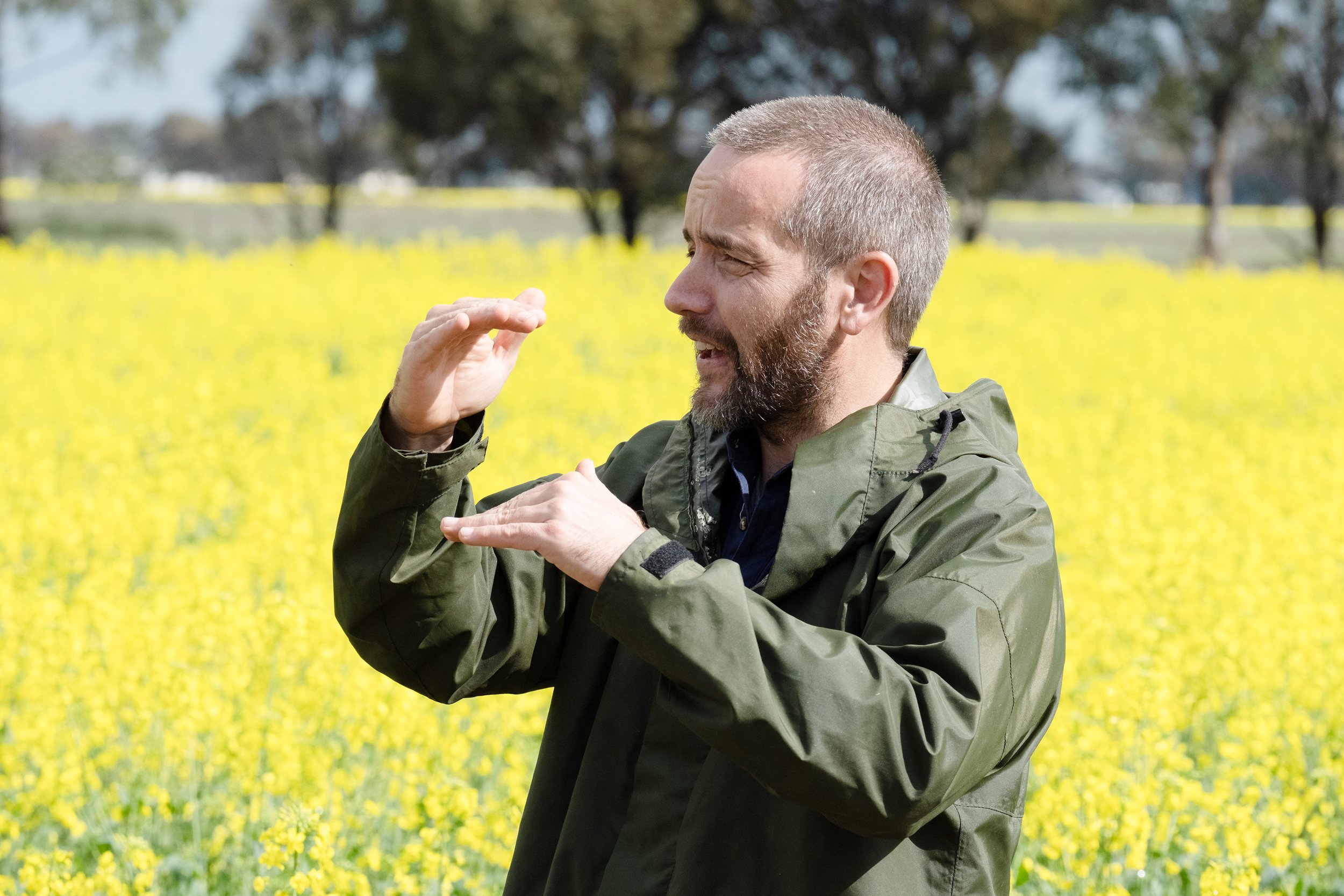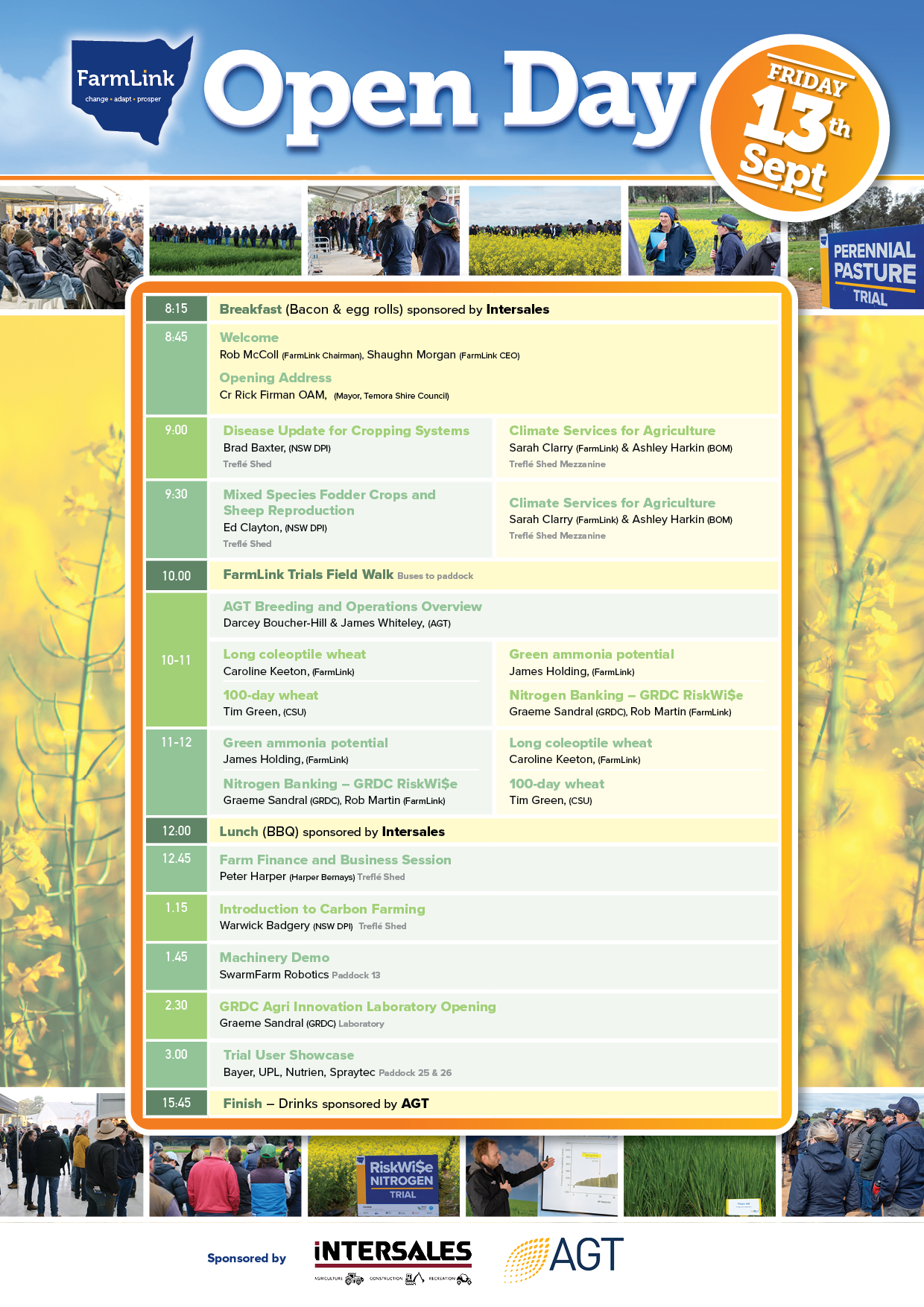FarmLink Open Day
FarmLink Open Day 2024
Thankyou to everyone that contributed towards a very successful 2024 Open Day – Steph Cooke MP, Mayor Rick Firman, presenters, participants, partners, exhibitors, the FarmLink Board & staff and anyone else we may have missed.
We very much appreciate the GRDC funding of our new Agri Innovation Laboratory and being able to officially open the facilities at our 2024 Open Day. Thanks to GRDC Extension Manager Charleton Glenn, Ms Steph Cooke MP and FarmLink Chair Rob McColl for the official opening ceremony.
And another big thankyou to our Open Day sponsors Intersales and AGT.
Open Day Speakers include
Dr Warwick Badgery
Research Leader Rangelands and Tropical Pasture, NSW Department of Primary Industries, Orange Agricultural Institute.
Dr Warwick Badgery is a research leader with NSW Department of Primary Industries and Regional Development (DPIRD) who has 20 years’ experience in the application of system level thinking to improve profitability, reduce GHG emissions and enhance sustainability of livestock and crop production systems. Warwick is leading the development of the Grazing Intelligence models, to forecast livestock and pasture production in commercial paddocks. He is a deputy Program leader for the Integrated Systems program of the Net Zero Ag CRC, was the Program Leader for the Feedbase Theme of the national Livestock Productivity Partnership, and is working across the MLA Carbon Storage and Emissions Avoidance Partnerships.
Photo: Nicole Baxter
Brad Baxter
Research Officer, Plant Pathology, NSW Department of Primary Industries
Brad Baxter is a Research Officer in Plant Pathology for the NSW DPI, based in Wagga Wagga. His work currently focuses on assessment of genetic resistance in cereal crops and leads the southern node of the Disease surveillance and related diagnostics for the Australian grains industry (NSW).
Dr Edward Clayton
Livestock Research Officer, Ruminant Nutrition, NSW Department of Primary Industries, Wagga Wagga Agricultural Institute
Dr Clayton completed a BRurSc (Hons) and a PhD in ruminant nutrition at University of New England (UNE) before commencing work with the then NSW Department of Agriculture in 1999. He has been involved with industry-based commercial research as well as research examining the effects of omega-3 fatty acids on a range of disease models in humans including risk factors for cardiovascular disease. Since taking up the position of Livestock Research Officer with NSW Department of Primary Industries Ed has worked in several areas related to forage production and omega-3 fatty acids, including forage quality, the effects of nutrition on reproduction, the impacts of diet on health attributes of meat, the heritability of methane production in sheep and utilising mixed annual forage species for improved animal production and health.
Tim Green
Charles Sturt University
I have a background at NSW DPI, previously working in the role of cotton pathologist for the south as well as having worked in the cereal pathology team in Wagga. My ongoing PhD has been focused on identifying the ideal set of physiological and developmental traits for the 100 day wheat ideotype. It has consisted of broad scale field trials, controlled environment experiments, and laboratory genotyping of phenology alleles.
“I’ll be presenting on the 100-day wheat ideotype. This model of a late-sown, high early vigour, short season wheat would be capable of being sown mid-winter and still produce profitable grain yields. Such a wheat would be suitable to extreme dry or wet starts or other delayed sowings.”
Ashley Harkin
Climate Services for Agriculture, Bureau of Meteorology
Ashley Harkin works as a customer engagement coordinator with the Bureau of Meteorology and has been involved with the Climate Services for Agriculture program for 2.5 years. In this time, she has been engaging with the agricultural sector to help inform the development of the My Climate View tool. Ashley also has a background in agriculture and has previously worked as an agronomist in NSW and is excited to continue supporting farmers and land managers to be more resilient in the wake of future climate challenges.
Photo Gallery FarmLink Previous Open Days




































